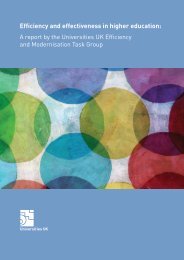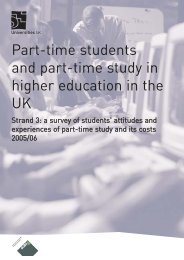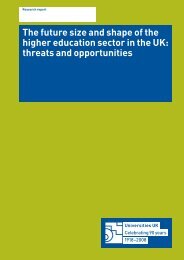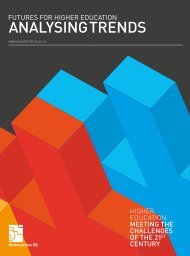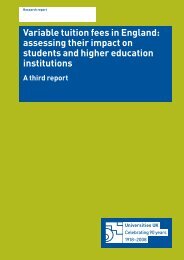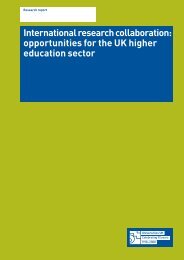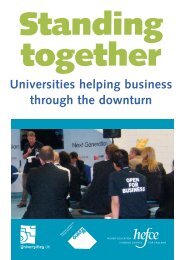The future of research - Universities UK
The future of research - Universities UK
The future of research - Universities UK
You also want an ePaper? Increase the reach of your titles
YUMPU automatically turns print PDFs into web optimized ePapers that Google loves.
11<br />
x4<br />
China has increased<br />
its <strong>research</strong> output<br />
four-fold over 10<br />
years, overtaking<br />
all but the USA.<br />
India and Brazil<br />
have both doubled<br />
their output.<br />
<strong>Universities</strong> <strong>UK</strong> – <strong>The</strong> <strong>future</strong> <strong>of</strong> <strong>research</strong><br />
Global partnerships<br />
<strong>Universities</strong> are global brands and need to consider their pr<strong>of</strong>ile and status.<br />
<strong>The</strong> <strong>UK</strong> is no longer an exceptional pinnacle <strong>of</strong> excellence to which others are<br />
attracted, but part <strong>of</strong> a more complex system in which competitiveness will be<br />
continuously challenged. Emergent <strong>research</strong> economies (particularly, but not<br />
only, China, India and Brazil), together with new global models <strong>of</strong> <strong>research</strong> and<br />
education, could present <strong>UK</strong> universities with a tremendous opportunity.<br />
<strong>The</strong> impact <strong>of</strong> much <strong>research</strong> from the emerging <strong>research</strong><br />
economies is <strong>of</strong>ten low at present, but the volume <strong>of</strong> <strong>research</strong> is increasing<br />
rapidly and there is no doubt that – as a result <strong>of</strong> increasing levels <strong>of</strong> investment –<br />
growing <strong>research</strong> quality will become pervasive. China and India will diversify<br />
and consolidate; south-east Asian ‘tiger’ economies are already maturing;<br />
new networks in Asia are strengthening. Current <strong>UK</strong> <strong>research</strong> collaboration<br />
with institutions in these countries <strong>of</strong>ten results in net benefit to them but,<br />
when the balance alters, the <strong>UK</strong> will benefit from a significant and supportive<br />
collaborative track record.<br />
China has increased its output four-fold over 10 years, overtaking<br />
all but the USA. <strong>The</strong> quality <strong>of</strong> this output has yet to match G7 levels but is constantly<br />
improving. India has doubled its output since 2000. Brazil has more than doubled<br />
its output. All have steep trajectories, as do Argentina, Iran, Korea and Mexico.<br />
Much <strong>of</strong> the growth has been in physical sciences and engineering, but it would<br />
be a mistake to interpret this as a key area for competition. Those economies once<br />
invested primarily in areas suited to industry, but are now turning to information and<br />
communications technologies (ICT), health and biotechnology and will challenge<br />
the <strong>UK</strong>’s lead in these more innovative sciences. Areas such as environment, health<br />
and social care, and business and economic studies present further opportunity.<br />
Understanding what the new economies are doing will not<br />
come from reading publications. <strong>The</strong> <strong>UK</strong> needs to be sitting at the laboratory<br />
bench to understand choices, decisions and priorities and to be able to absorb<br />
different cultural approaches that may produce distinctive outcomes. Unfortunately<br />
the historical relationship has been one where <strong>research</strong>ers from these countries<br />
have come to learn in the <strong>UK</strong>, which they will less <strong>of</strong>ten need to do in the <strong>future</strong>,<br />
while <strong>UK</strong> <strong>research</strong>ers have been less driven to travel, usually because the needs<br />
and benefits were that much less.<br />
Beyond the movement <strong>of</strong> individual <strong>research</strong>ers there is<br />
the nature <strong>of</strong> institutional relationships. <strong>The</strong> <strong>UK</strong> has tended to focus on driving<br />
<strong>research</strong> excellence, but a growing economy may want something simpler<br />
and more tangible, since excellence remains aspirational. Feedback suggests<br />
that German universities have been preferred partners because they provided<br />
access to technology as much as science, <strong>of</strong>fering advanced equipment against<br />
firm partnership commitments. <strong>The</strong> possibility that the Max Planck network may<br />
link into South Korean institutes reinforces this.<br />
<strong>UK</strong> universities have many international links, some <strong>of</strong> long<br />
standing. Relationships with Europe are pervasive and <strong>of</strong>ten strong, but elsewhere<br />
they are <strong>of</strong>ten surprisingly thin. For example, the <strong>UK</strong> university collaborating most<br />
frequently with India in engineering produces an average <strong>of</strong> just five co-authored<br />
papers per year. <strong>UK</strong> universities will want to examine how they can commit to a<br />
wider range <strong>of</strong> partnerships with practical foundations, including collaborations<br />
that open opportunities to access transnational-funding for projects that are too<br />
large for one country to pursue.<br />
Closer to home, if the <strong>UK</strong> is to meet the ERA target <strong>of</strong> 20 per cent<br />
<strong>of</strong> EU doctoral candidates working outside their home country, then further cultural<br />
change is required. <strong>The</strong> <strong>UK</strong> lags well behind most other European countries.<br />
While a rising 2.6 per cent <strong>of</strong> EU27 students spent at least part <strong>of</strong> their studies<br />
in another EU member state in 2006, the <strong>UK</strong> has a lower 0.7 per cent <strong>of</strong> students<br />
studying abroad.





